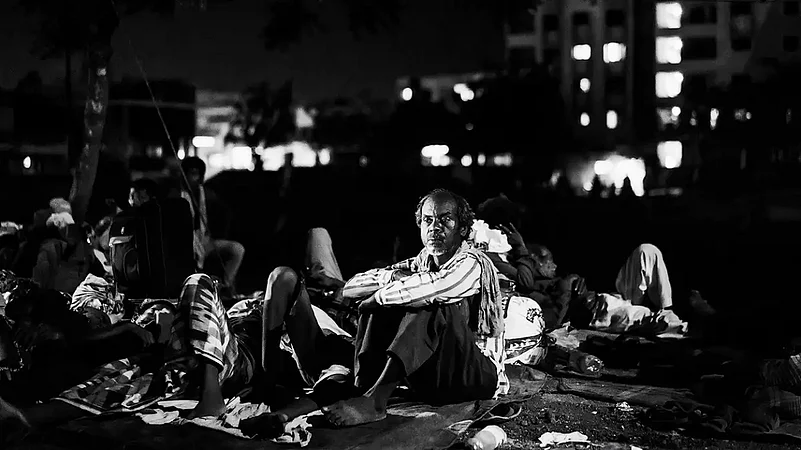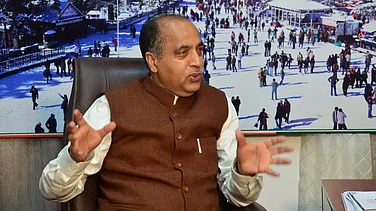Suresh, a 45-year-old migrant, worked in a small unit in Mumbai, manufacturing electronic meters. The catastrophic effect of Covid had shut down the unit, which resulted in his losing the job. Since the first wave of the pandemic, Suresh has been at his native village near Jaunpur in Uttar Pradesh, where he returned during the lockdown in May 2020, after he lost his job in Mumbai, his address for a decade. He was jobless for almost a year but was hopeful life would get back on track after the government revoked the lockdown. Instead, the Covid second wave amplified the catastrophes, leaving Suresh with no option but to look out for alternative opportunities. With the help of his family members and friends, he started a book and stationery shop at his village.
Suresh is not alone. According to the recent report of Action-Aid India, 54 per cent of those who had returned to their native villages during the first lockdown want to remain in these areas. The miseries of migrant labourers were not a new phenomenon, but the Covid pandemic exposed them severely.
With labour migrants having experienced adverse effects from two consecutive waves of Covid, it is essential to comprehend their current socio-economic condition. How do they negotiate the adversity of Covid in terms of livelihood, economy and health? How does the State respond to their miseries? And what can be possible policy measures to address their precarity?
Fear of disease, lack of opportunity and uncertainty of life and livelihood at the destination area are significant reasons for them to stay back at the source. Covid protocols and guidelines are also major contributing factors in their unwillingness to migrate. This can be understood perfectly in the word of Bale, a 43-year-old migrant from Uttar Pradesh living in Mumbai, who says: “Corona me jo yahan se wapas gaon chala gaya, usme se bahut kam log wapas aa rahe hai, kyon ki ek to kaam nahin mil raha hai, jahan bhi log kaam karte thhe, sab dhandha bandh ho gaya hai. Agar kaam mil raha hai to pagaar kam hai, aur upar se local (train) bandh thhi, auto ka bhada bahut zyada hai. Aur to aur, khoraki zyada gir raha hai [Those who have returned home during Covid lockdowns do not wish to return because employment is scarce, most enterprises have shut down. Even if one finds a job, salary is low, local trains are suspended, auto fares are too high and cost of living has risen significantly]”. Bale’s opinion highlighted the multifarious problems migrant labourers need to negotiate —lack of employment at destination, cost and availability of local transport, high cost of living—before they can decide on their return. Action-Aid India’s study also highlighted a similar pattern, with 53 per cent of migrants who had returned unable to find a job, compared to 43 per cent of non-migrant workers.
Families of migrants in general and those who returned in particular have faced the brunt of the economic downturn, because their wage earners find it more difficult to acquire an alternative source of survival. The study shows while migrant workers’ savings dropped from 48 per cent to 1 per cent, their debt also rose significantly. This compels them to undergo huge social, economic and psychological agony at source itself. Numerous studies have found that ‘half the workforce has lost work and income, while over two-thirds are suffering from increased hunger’. Action-Aid India says over 50 per cent of migrant workers have reduced their food intake due to lack of income, causing a drastic fall in the level of nutrition intake considered sufficient. Accessibility and food affordability have become the ultimate challenge for labour migrants during the pandemic, because of loss of work and poor social safety nets. Moreover for migrants, issues of job loss and food insecurity overlap with poor health conditions. On top of that, the poor socio-economic living conditions and loss of livelihood have led to a shortage of necessities, causing extreme mental stress among migrants. The manifestation of worries, loneliness, anxiety, fear, hopelessness and isolation was visible in their lives in the form of rising domestic violence and frayed relationships. Uncertainty over getting infected and livelihood insecurity made them panic more. Within these migrants, Dalit, Adivasi and other backward classes were, expectedly, found to be much more vulnerable because of their lower social identity and social capital. Evidence that Dalit and other marginalised migrants experienced caste-based discrimination and exclusion at quarantine centres during the pandemic, is reminiscent of the words of author Harishankar Parasai: “Jati, kabhi nahin jati [caste never goes away]”. This is not a new phenomenon but a historically existing fact—migrants from lower castes are victims of caste-based discrimination and exclusion, both at destination and source. In fact, within migrants, members of Dalit and marginalised communities are marked as ‘others’, highlighting their underprivileged social, economic and cultural position.
Effectively, issues of migrants can’t be seen monolithically, but need to be based on their social and economic positioning.

The suddenness of the government’s lockdown announcement, suspending all transport, reveals its insensitivity towards migrants. To a large extent, the State was responsible for the melancholy and suffering of the migrants during the pandemic. Eventually, nationwide unrest and civil society pressure forced the State to announce several immediate measures to tackle the concerns of migrants. The government announced special shramik trains and other modes of transport to carry migrant labourers back home. It also provided free foodgrains to migrant workers—initially for two months, later extended for few more months—which provided them some relief. The expansion of the government’s initiatives to assist the poor in general and migrants in particular—such as providing cash transfer of Rs 500 to women Jan Dhan account holders, basic income through PM Kisan Yojana, health coverage through PM Arogya Yojana and access to employment under MNREGA—were beneficial. But these were not enough to meet the long-term existing needs of poor and migrant workers, to which Covid merely drew nationwide attention. It is, in fact, strange that despite most of the destination states and cities recording high economic growth and rising urbanisation, they failed to offer dignified living spaces for migrants. Labour migrants mostly inhabit slums or low-income rental housing, which suffer from poor infrastructure, water scarcity and poor living conditions. Indeed, their miseries often overlap with harassment, long working hours, harsh working conditions, workplace injuries, lack of social security and exclusion. Even migrants living in slums are mostly Dalits. Many migrants are forced to live on pavements or in parks. Altogether, these problems put them in the most vulnerable category in the cities. Their mobile status prevents them from social security entitlement at their source.
The age-old misery of labour migrants overlaps with emerging socio-economic and livelihood problems due to Covid-19. The State must ensure the safe, secure, and dignified mobility of migrant workers through proper policy mechanisms. Firstly, it should provide appropriate data of migrant workers—collected with the help and participation of local self-governance bodies at the village (panchayat) or urban levels. The registration of migrants at the panchayats of origin villages and their further registration at local self-governance offices of destination cities will help the government keep a record of the migrant population, which will certainly help in appropriate channelisation of social safety nets for migrants.
Secondly, there is a need to ensure their access to the entitlement of social security provisions like Jan Dhan Yojana, ration under PDS, guaranteed manual jobs under MNREGA, etc. Within that, special focus should be given to Dalit and other marginalised migrants to make inclusive social policy.
None of these social security measures will be helpful until the State and society develop a migrant-friendly attitude and acknowledge their contribution to the social and economic growth of villages, cities, states and the nation.
(This appeared in the print edition as "Life at the Crossroads")
(Views expressed are personal)
Ajeet Kumar Pankaj is Assistant Professor of Social Work at IGNTU (Regional Campus, Manipur)























